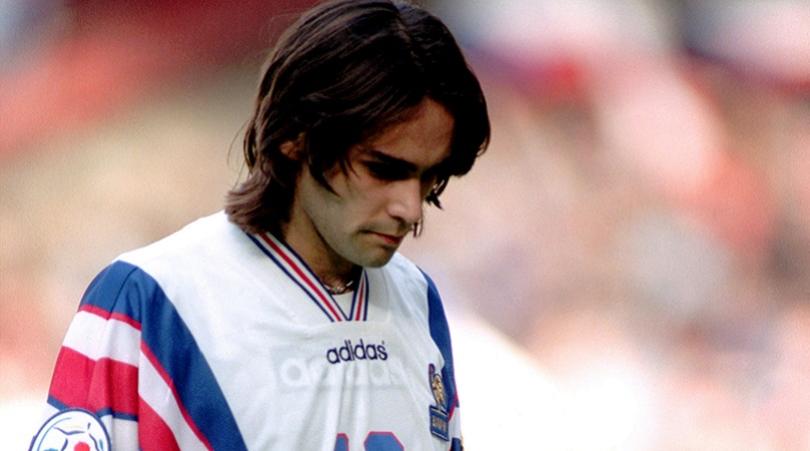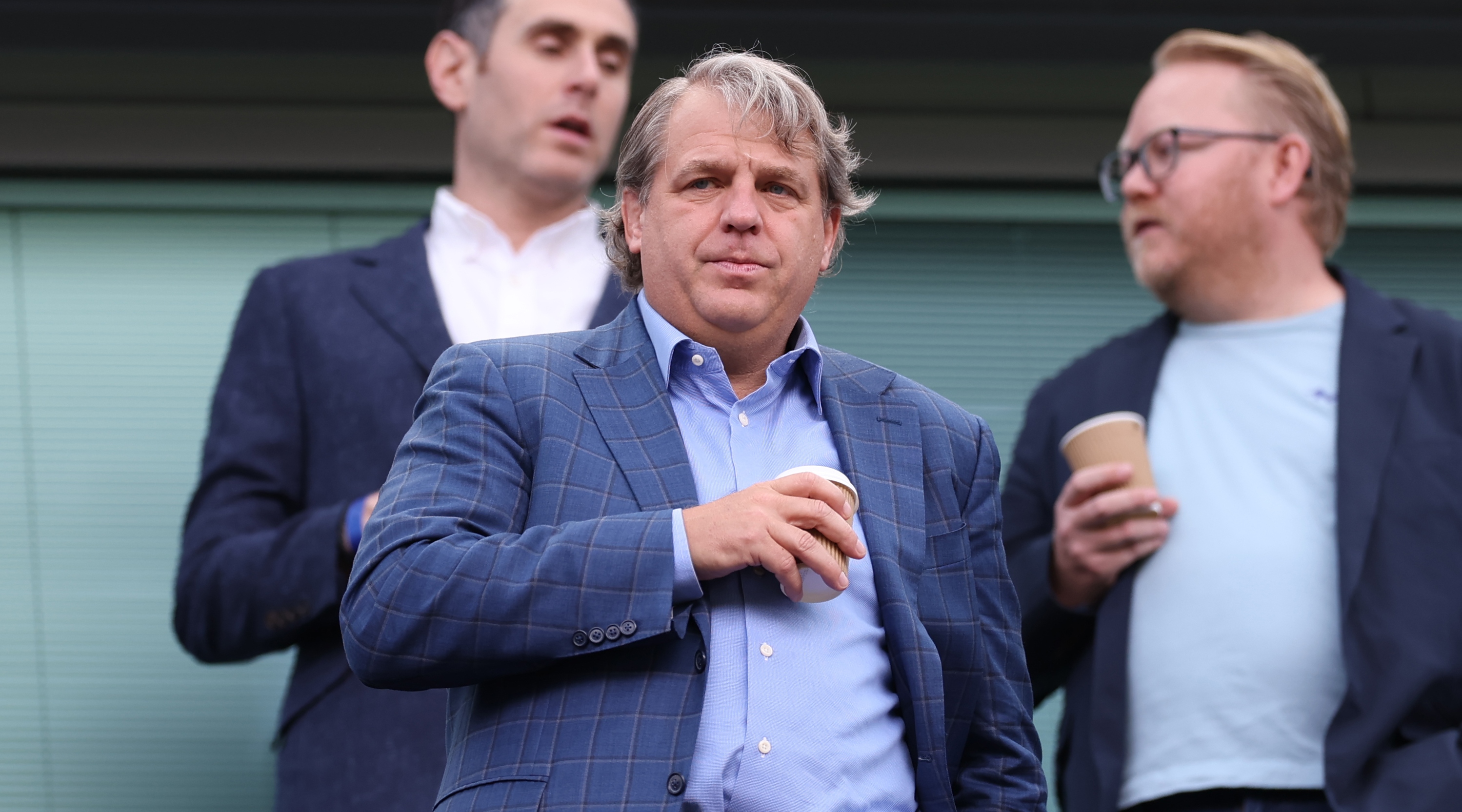Long read: Ronaldinho – How the godfather of flair changed football forever
His constant desire to entertain made him football’s ultimate cult icon. Now, the Brazilian genius invites FFT over to his place to explain how he inspired the new generation, what he's planning to do next, and why he wishes he was Dele Alli
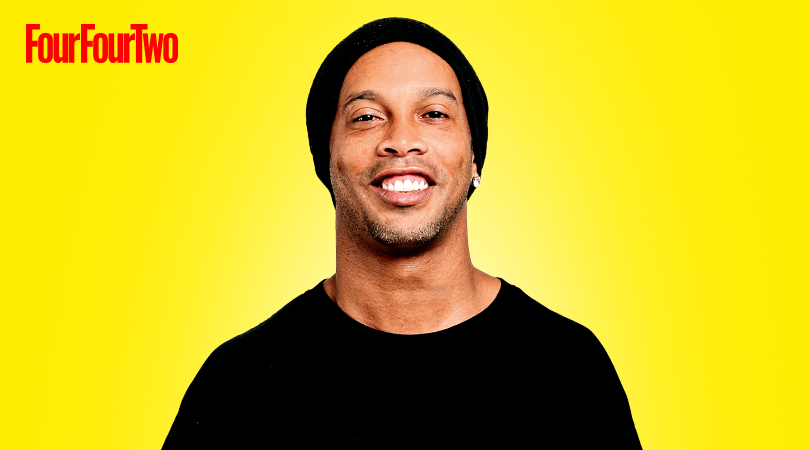
FourFourTwo is in Rio de Janeiro, a stone’s throw from the 2016 Olympic Park, and we’ve just received an offer we can’t refuse.
“Would you like some of my chocolate cake?” Ronaldinho asks, directing his trademark grin towards us rather than the camera, midway through his FFT photoshoot. Chocolate cake is appealing enough on any occasion. When it’s being offered to you by one of the greatest players of all time – well, don’t mind if we do, thanks Ronnie…
Soon we’re sitting alongside the fun-loving legend, feasting on bolo no pote, otherwise known as cake in a pot. It’s a product sold by his very own sister-in-law, and tasty it is, too. We're in Ronaldinho’s swish apartment on the outskirts of Brazil’s most famous city, almost 20 miles west of Copacabana. But if all this sounds like a quiet retreat, it isn’t – not when you consider the plethora of musical instruments dotted around his home, including a host of acoustic guitars and pretty much every kind of drum imaginable.
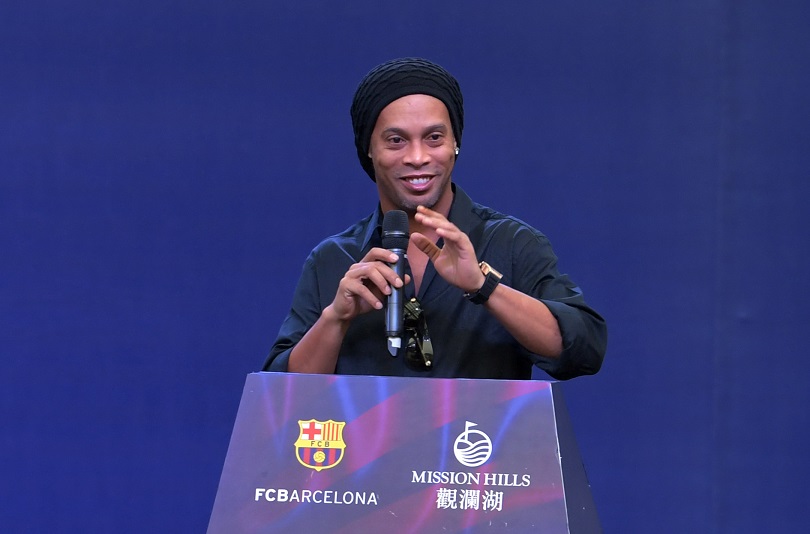
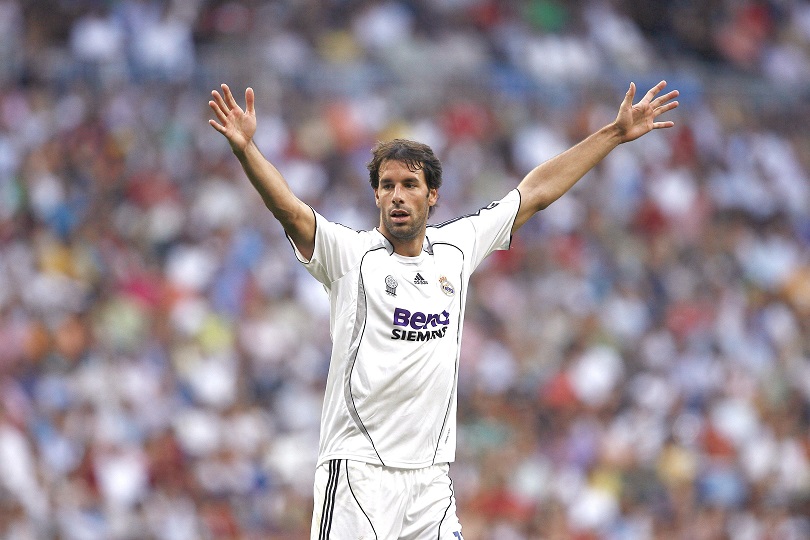
Ruud van Nistelrooy (2006): “He’s the greatest player in the world. I just can’t get enough of watching him play – he’s a delight for the eyes. His technique is incredible, he scores goals and he orchestrates everything. I know how hard it is for a forward playing at this level, but for him it’s easy. He does it every game and it’s unbelievable to watch. If I fear anyone at the World Cup, it’s Brazil and Ronaldinho.”
Ronaldo (2014): “He'd destroy a player, then laugh and joke with them when the game was over. I’ve never seen anyone else do that.”
Ronaldinho has been dancing to the beat of his own drum since the very start of his football career – a career that has been just as much about joie de vivre as joga bonito. That perhaps is the biggest reason he’s adored the world over, not just in Barcelona and Brazil, and why he inspired a generation. He wasn’t just a truly great footballer – he looked like he enjoyed being a truly great footballer, too. If few players have been quite as much fun to watch, even fewer have had quite as much fun being watched.
“There was this guy from Athletic Bilbao, he was kicking me for the whole match,” Ronaldinho grins as he tells FFT about a game during his days at the Camp Nou. “So I flipped the ball over him three times!”
The grin quickly turns to laughter, as he thinks back to that moment in 2004 when Carlos Gurpegui was embarrassed by not just three flicks in 90 minutes, but three in five dizzying seconds. Unlucky mate, better luck next time, eh? Few would have been capable of such a trick. Even fewer would have actually dared to try it.
Ronaldinho’s skills dazzled in a way that no one had seen before. Not even Lionel Messi, his glorious successor at Barcelona, can snatch the Brazilian’s crown as the king of the showboat. Oh, and he also won the World Cup and the Champions League, too.
Get FourFourTwo Newsletter
The best features, fun and footballing quizzes, straight to your inbox every week.
Ronaldinho wants to make one thing clear, though. He may be 36 now, and he may have spent the entirety of 2016 without a club, after leaving Fluminense in September 2015, but his career is not over just yet. At the time of FFT’s visit, the plan is to find a new club and play until the end of 2017. “I always have a lot of offers,” he explains.
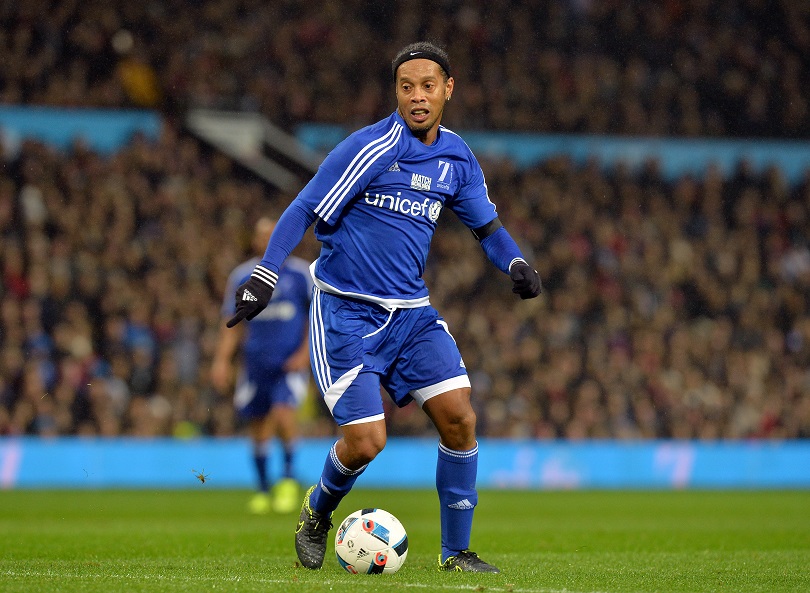
Scoring in the small hours
When the clock reached 1.24am, midway through the second half, the club’s latest signing picked up the ball inside his own half and headed for goal
Ronaldinho spent five years at Barcelona, but there’s one moment he remembers better than any other. Naturally, it took place at 1.24am. It wasn’t uncommon for him to be wide awake at that time, rather than quietly tucked up in bed, but on this occasion his exploits in the early hours weren’t part of any raucous partying. Instead he was in the middle of the Camp Nou, in front of 80,000 spectators, making his home debut for the Catalan behemoths.
“The most memorable match was the first one,” he tells FFT of that moment in 2003, shortly after his move from Paris Saint-Germain. “It started at 0.01am. There was some fight with the federation and we had to play Sevilla in a full Camp Nou at that time on a weekday. It was the first and only time that I played at that time. But it was no problem – that’s my favourite time of day...”
The bizarre kick-off time had threatened to take all the headlines – Barcelona’s attempts to switch the game from Wednesday to Tuesday were refused; in a fit of pique, they decided to kick off at the earliest possible time on Wednesday to prove a point.
When the clock reached 1.24am, midway through the second half, the club’s latest signing picked up the ball inside his own half and headed for goal – drifting past one opponent, stepping inside another, before unleashing a hammer of a shot from 30 yards that crashed off the underside of the bar and into the net. A Barcelona legend was born.
“I scored a screamer and the stadium just went mad,” is how he succinctly sums it up, the memories flooding back. ‘Ronaldinho out scoring until the small hours,’ read one of the local newspaper headlines the following day.
By proving a success at Barcelona, he was following in the footsteps of one of his heroes. Ronaldo had wowed fans with 47 goals in his solitary season with the club six years earlier. In 2002, a year before Ronaldinho first set foot in Catalonia, the pair had lifted the World Cup together in Japan.
“I played for Brazil at such a fantastic time,” Ronaldinho says. “I was always playing with my heroes. It was a very short time until my heroes became my team-mates, my friends. Each time I was called to play with them, it was another dream come true.
“Even now, I am always star-struck. Each time I kiss Ronaldo on the cheek, each time I hug Romario, each time I see Rivaldo, each time that I’m in the same place with Roberto Carlos or Cafu, it is always very emotional for me. They will always be heroes.”
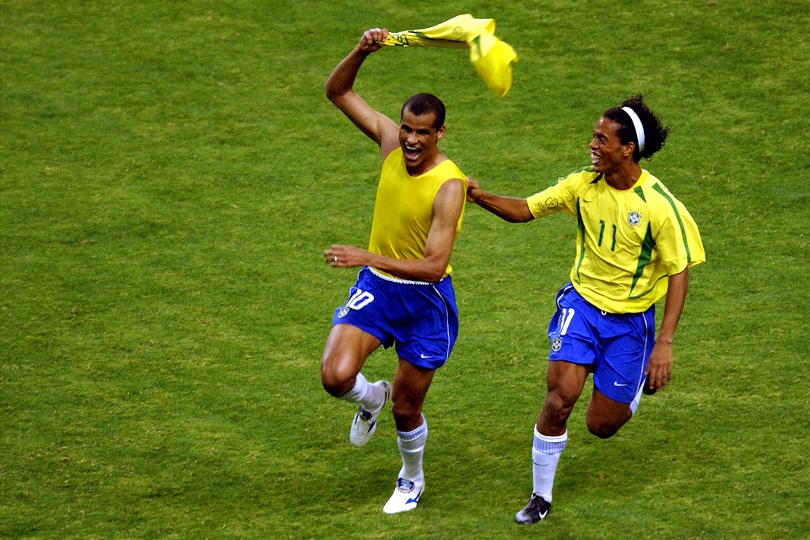
World Cup glory
While Ronaldo and Rivaldo dominated the headlines in the early games, with Ronaldinho scoring a solitary penalty against China, few will forget how he stole the show iagainst England
If Ronaldo was known for having a few tricks and flicks himself, then Ronaldinho never attempted to outdo one of his idols for skills on the training field.
“I never even dared to do that,” he says solemnly. “I have the utmost respect for him – Ronaldo is now our national team president. To be friends with him is one of the greatest honours for me. It was always very natural between us both.”
Ronaldinho was only a year into his senior career at Gremio when he joined Ronaldo, Rivaldo, Roberto Carlos and Cafu on the field in his first competitive match for Brazil, as a substitute against Venezuela at the 1999 Copa America. Within four minutes he had received a pass from Cafu and flicked the ball over the head of a defender (just once was enough this time) before firing home a brilliantly impudent goal. Weeks later, he was the player of the tournament at the Confederations Cup in Mexico.
He was a PSG player by the time the 2002 World Cup came around. While Ronaldo and Rivaldo dominated the headlines in the early games, with Ronaldinho scoring a solitary penalty against China, few will forget how he stole the show in the quarter-final against England. First the dribble from halfway, the stepover to bamboozle Ashley Cole and the pass to Rivaldo for Brazil’s first goal. Then the 40-yard free-kick to flummox David Seaman.
“It looked like it was going to be a cross, but it was totally intentional,” Roberto Carlos told FFT years later. “We’d seen that Seaman always took a little step forward and that he might be a bit vulnerable to being chipped. Ronaldinho had told us all exactly what he wanted to do during half-time.”
Ronaldinho got sent off in that game, too, but it hardly mattered by then. He was back when Brazil were crowned world champions.
Destination Camp Nou
Once Laporta had been elected, and with Beckham now bound for the Santiago Bernabeu, Rosell went all out to bring in Ronaldinho, and the forward opted for Barcelona
“I don’t want to be disrespectful,” began Roy Keane – a sure sign that he was about to be disrespectful. “But any player who does not want to sign for Manchester United needs to have their head examined.”
The player he was talking about at the time was Ronaldinho. The Brazilian had seemed destined for Old Trafford in the summer of 2003 – David Beckham was supposed to go to Barça, with Ronaldinho moving from PSG to replace him at United. But Beckham chose Real Madrid instead, and Barcelona needed to find themselves another star.
That summer, Joan Laporta was embroiled in a battle to become Barça’s new president. His running mate was a certain Sandro Rosell, who knew Ronaldinho from his days working as a Nike executive in his native Brazil. Once Laporta had been elected, and with Beckham now bound for the Santiago Bernabeu, Rosell went all out to bring in Ronaldinho, and the forward opted for Barcelona. Alex Ferguson’s excursion to Paris to meet the player and his agent – his elder brother, Roberto Assis – ultimately wasn’t enough to seal a deal. Weeks later, United brought in a young Cristiano Ronaldo instead.
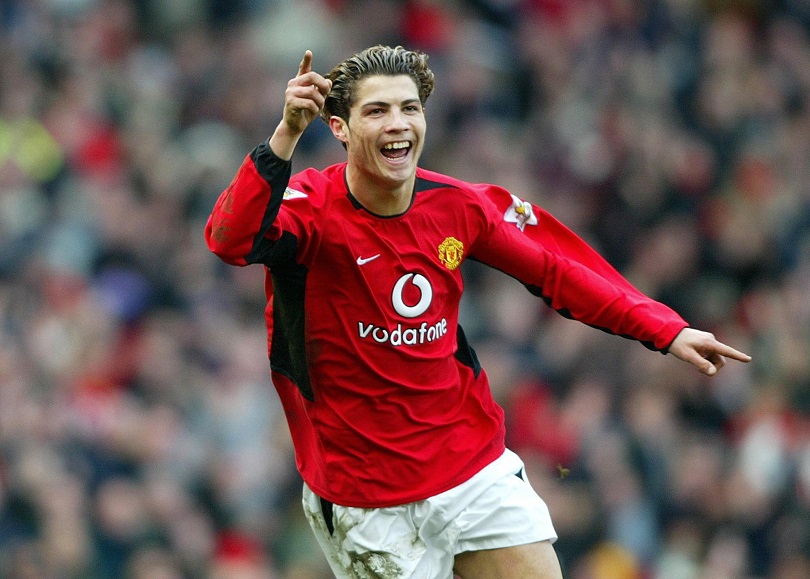
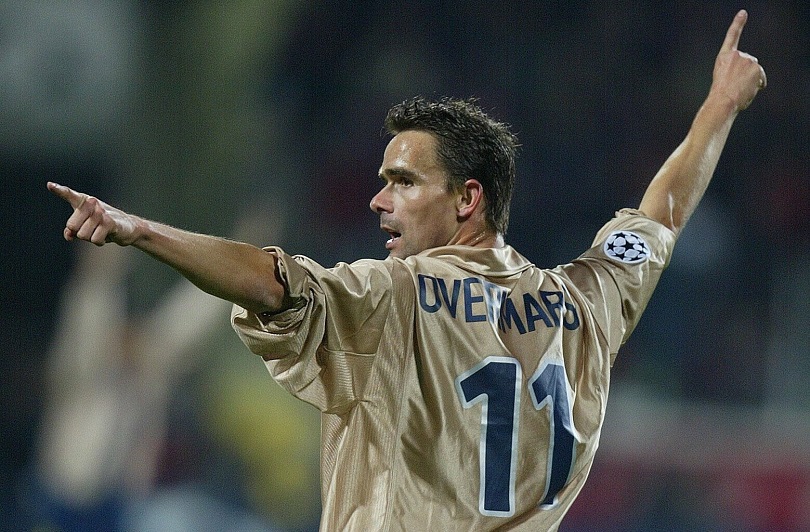
Marc Overmars (2016): “Ronaldinho was without any doubt one of the best players that I’ve ever played with. When we were at Barcelona together, he could win games for us all on his own.”
Daniel Sturridge (2016): “I used to watch Ronaldinho when I was younger, when he was at Barça, and think: ‘Oh my god, what am I seeing here?!’”
Ronaldinho has certainly never regretted his decision – it never particuarly bothered him that Beckham had been the Catalans’ first choice that summer, not him.
“I never even thought of that,” he says now. “Yes, I could have played for another club, but I went to Barcelona because of my friendship with Sandro Rosell. I could have played for Manchester United. My brother was already studying what I would do after PSG. I was a World Cup winner then, and that opened a lot of doors. But when Sandro was elected, I had the chance to see the club and the city, and the choice became easy.”
While United were champions of England, Barcelona had finished sixth in the previous season, behind Valencia, Celta Vigo, Deportivo La Coruna, Real Sociedad and champions Real Madrid. But with Joan Laporta now taking over, Ronaldinho was joining a club with a massive determination to improve.
“Everything changed at Barcelona,” he says. “It was in all our heads to make a different Barcelona, to mount the challenge to the Galacticos and do it with a very young team to change the story. I was never worried.”
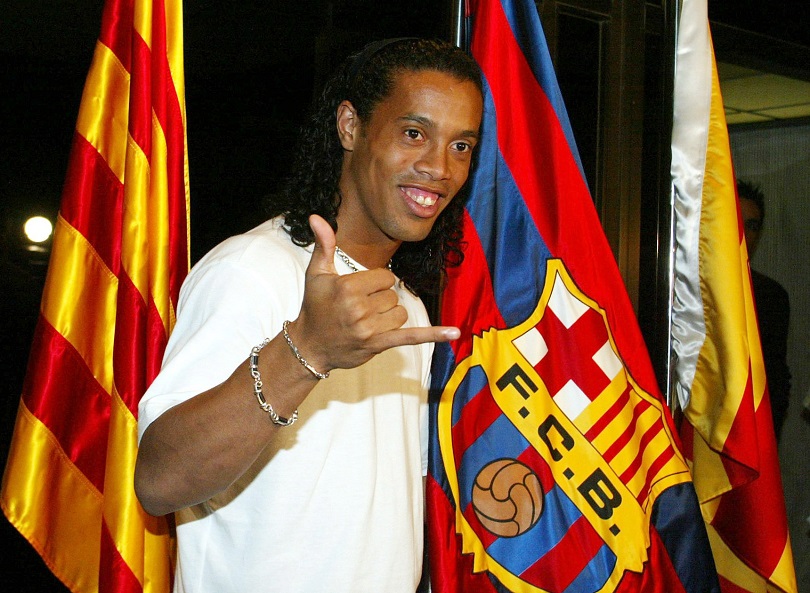
Never worried, despite the fact that the Blaugrana won only six of their opening 18 league games in his debut season at the Camp Nou. Just after the turn of the year, they were down in 12th.
Even then, he never feared that he may have made the wrong choice. “No, it was never the case,” he explains. “Being in that team was a huge pleasure from the start to the end. Everyone had the same mindset. We were sure it was just a matter of time for things to come together. We felt that the project was going in the right direction. Not one player in that team had any doubts – we didn’t feel pressure. Seriously. Not a bit. I was too happy playing for the same team that my heroes had all played for.”
Success in Spain
Xavi credited that result as the start of what he called ‘the Barcelona rise’, the result that gave them the belief to become the best in the world
As it turned out, Barcelona won 15 of their final 20 league games to rocket up the table, coming second to Valencia. Frank Rijkaard, appointed as boss shortly before Ronaldinho’s arrival, was starting to make his mark at the club.
“It was wonderful to work alongside him,” Ronaldinho says of the Dutchman. “He is the coach that I served the longest, the best coach that I had. I could spend an entire day saying good things about him. Not only was he a great player, but he also understood what makes players tick. He made it a real pleasure for us to play for him. I was happy to go to training. We wanted to train for him, to play for him, to be with our team-mates. He made everything special.”
Barcelona had been 18 points behind Real Madrid at the halfway stage of that debut campaign, having finished behind their arch-rivals in each of the three previous seasons. They were still seven points behind them with five games to go when they travelled to the Bernabeu in late April 2004, a place where they hadn't won for seven years.
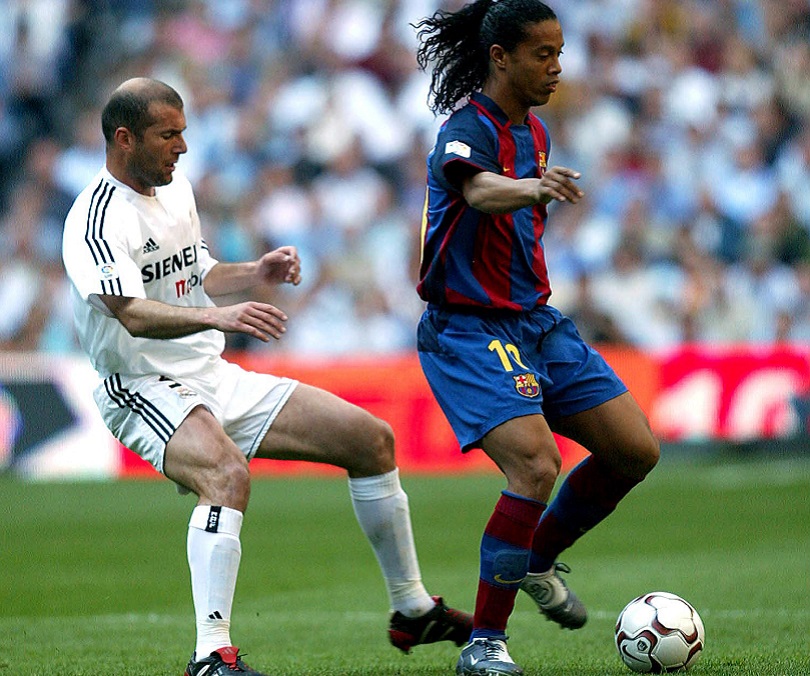
The Galacticos’ dominance appeared to be continuing when Santi Solari put Real Madrid ahead. But Patrick Kluivert quickly equalised and then with four minutes to go, Ronaldinho collected the ball 30 yards out – looking up, he spotted Xavi’s run into the penalty area and picked him out with the most sumptuous of scooped passes. “What a pass it was,” Xavi told FFT last year – the Spaniard did the rest, and Barcelona triumphed 2-1.
“It just happened, it was all so very quick,” Ronaldinho says of his famous assist. “It was an unusual attack because Xavi was up front. We even waited for the linesman because we didn’t know whether he was offside or not. But there was a very big change after that game. When we arrived back at the airport, you would have thought we had won the title – there were just so many people there at the airport. Nobody expected that.”
Xavi credited that result as the start of what he called ‘the Barcelona rise’, the result that gave them the belief to become the best in the world. By winning at the Bernabeu that night and then finishing above Madrid, the balance of power had shifted.
When Valencia soon departed the scene, fading very quickly following Rafael Benitez’s departure for Liverpool, it left Barcelona and Real Madrid to battle it out. Now it was Barça who were dominant over their rivals, and it resulted in two consecutive league crowns.
Fake news
The story suggested that Ronnie had called Iniesta earlier on the day of the game to explain that he’d agreed to join Real Madrid for a massive pay rise
Ronaldinho – a player who Real Madrid decided against buying during his PSG days, reportedly because one of the club’s hierarchy said he was “so ugly he’d sink you as a brand” – was playing such a pivotal role that he was named FIFA World Player of the Year in both 2004 and 2005. A month before clinching the second of those prizes came his finest Clasico moment, usurping even his brilliant 2004 assist – and by some distance.
Sergio Ramos probably still has nightmares about it. The young defender was playing in his first Clasico when Ronaldinho ran from inside his own half of the Bernabeu pitch, dancing past Ramos and stepping inside Ivan Helguera to score a wondrous goal.
Seventeen minutes later Ronaldinho went on another run, skipping past Ramos again before finding the net once more. “Virtually unstoppable,” is how the Madrid hero has since described Ronaldinho, and even that seemed an understatement – on that night at least, Ronnie was completely unstoppable. Barcelona won 3-0, and Ronaldinho received a standing ovation from the fans.
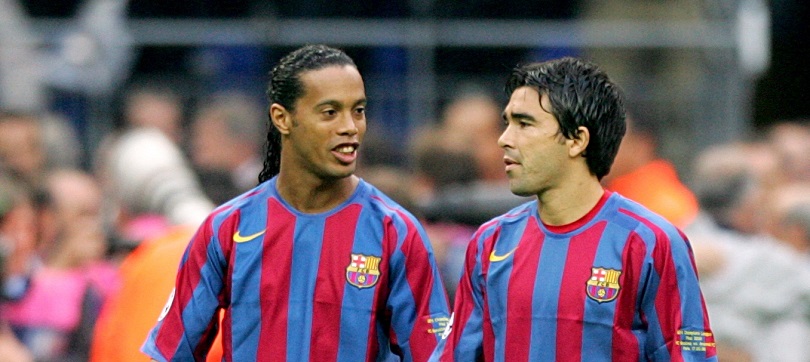
Deco (2015): “Sometimes he did things that I never saw anyone else do. When we’d be winning the game, we’d start to enjoy ourselves and he would bring it all out.”
Paolo Di Canio (2006): The footballers that represent me today are people like Ronaldinho, because even though I don’t know him very well, he is authentic, he smiles on and off the pitch.”
“I value that a lot more now than I did back then,” he says, when asked what the applause of the Bernabeu meant to him. “At the time I didn't give it much importance because I had to think of the following game. But now... very few players get such an honour there. Today, I am three times happier when I remember that. Many of my friends send me videos of those goals. They know that I don’t look for my goals online – I only look for the videos of the nutmegs I did!”
There’s a story that has been doing the rounds recently about that match. It was a story that’s been attributed to Andres Iniesta’s autobiography, suggesting that Ronnie had called the midfielder earlier on the day of the game to explain that he’d agreed to join Real Madrid at the end of that season for a massive pay rise. Supposedly Ronnie had made a late-night phone call to each of his team-mates with this news, asking them not to divulge it to anyone.
So the story goes, before kick-off at the Bernabeu, Ronaldinho revealed it had all been a joke but told his team-mates that the fact none of them had betrayed his secret proved their bond as a group, and proved they were ready to win.
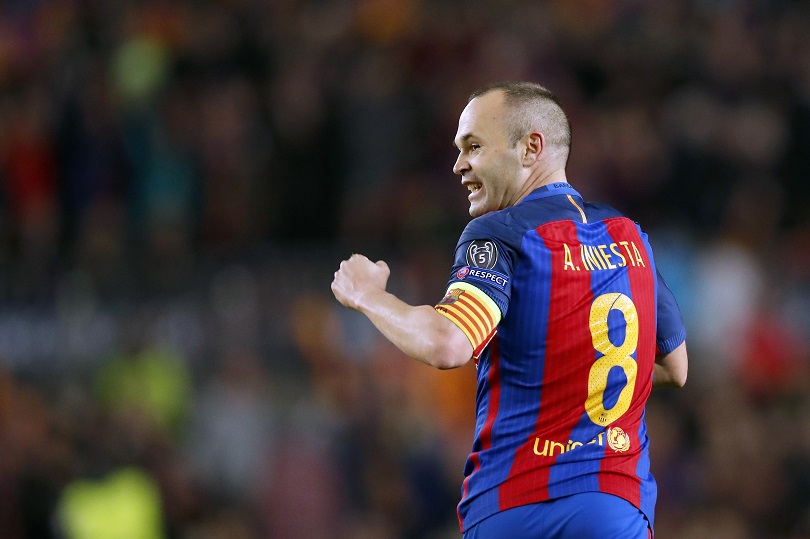
“I don’t remember that,” Ronnie says, and indeed the writer who produced the English translation of Iniesta’s autobiography had previously confirmed that, sadly, no such story was in the book. The tale wasn’t true. “But it is true that I was always a prankster,” Ronaldinho adds.
“I would often do things to motivate my team-mates in the dressing room, especially against Real Madrid. I had to, because that’s a game that put on the pitch all of the best players in the world, and many of the best in history. I remember one goal I scored from a free-kick – in their wall they had Luis Figo, Zinedine Zidane, Ronaldo, David Beckham… Playing in the Clasico, you needed a bit of stress relief.”
FFT is curious for details of these pranks, but Ronnie is keeping schtum. “I’ve seen and been in a lot of pranks, but what happens in Rome stays in Rome!” he cackles.
"We never doubted we'd beat Arsenal"
Sol Campbell headed the north Londoners into a half-time lead but Eto’o levelled with 14 minutes to go, then right-back Juliano Belletti emerged as the unlikely hero
It was in Paris, not Rome, that Ronaldinho helped Barcelona to win the Champions League in 2006, only the second time that the Blaugrana had been crowned European champions in their history.
“We just couldn’t stop winning that season, it was addictive,” he says. “Each year after I arrived, we brought new good players. As Barcelona got stronger financially, the team flowed better. Everyone was in a great moment at the same time, it was just so easy. Deco only gave me good passes, Samuel Eto’o knew what he had to do every time. No one ever wanted difficult solutions. In that campaign we were driven. We thought we could beat anyone.”
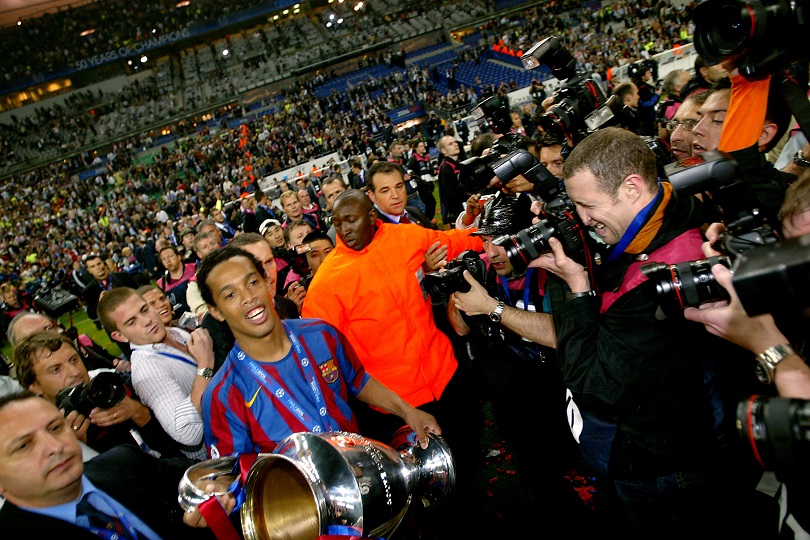
Back in the city where he had spent two years with PSG, Barcelona didn’t have it all their own way in the final against Arsenal, even after Jens Lehmann’s early dismissal. Sol Campbell headed the north Londoners into a half-time lead but Eto’o levelled with 14 minutes to go, then right-back Juliano Belletti emerged as the unlikely hero.
“We never doubted we would win that match,” Ronaldinho insists. “Even when we were losing, we knew they were one man down and that it would cost them. We just figured that we didn’t need to rush, we just had to play our football. It could have been more than 2-1 – we kept it at that score so that Belletti could say he scored the decider! That was his only goal for Barcelona.
“We had a massive party in Paris after the game. I had many friends there so I went to celebrate with them, and some team-mates came along. Everyone brought their families, so some were celebrating with them after our party, too. It was a great night.”
Lionel Messi had missed that final through injury, but his reputation was already on the rise. Ronaldinho was his inspiration.
“He’s a phenomenon,” an 18-year-old Messi told FFT back in 2005. “Ronaldinho gives me a lot of advice and praises me permanently. He’s got an ability to control the ball which makes me jealous. At any moment during a game he can do something special to win it – and that’s what I must aim to do.”
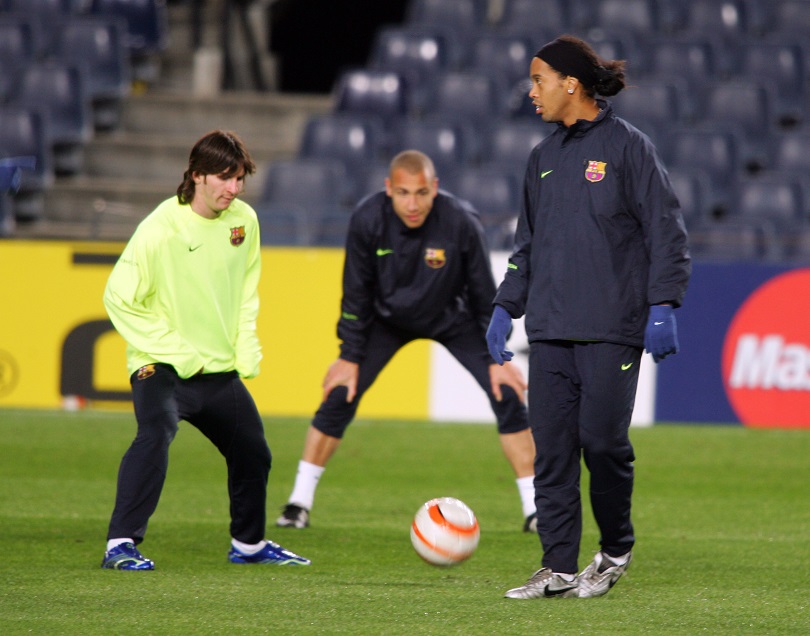
Messi soon learned to do just that, and with a little bit of help from Ronnie. “Everyone saw he was fantastic from the very first day,” says Ronaldinho, who provided the assist for the Argentine’s very first Barcelona goal, against Albacete.
“I wanted to do with him what others had done with me: I wanted to help him in that first-team moment, because the talent was already obvious. When I started at Gremio I had experienced players helping me – my friends Beto and Guilherme. At Barça it was Carles Puyol, my big brother, my eternal captain who is always with me at charity events. I wanted to give back.”
Beginning of the end
Ronaldinho insists that there was no truth in the speculation that Barca were not happy about his lifestyle, and that he was leading Messi astray
Ronaldinho scored 21 times in 32 league games in 2006/07, his best La Liga haul, but Barcelona lost out on the title to Madrid. The two rivals finished level on points and Barça had a goal difference 19 goals better than Los Blancos, but it was Real who had the superior head-to-head record.
It would mark the start of the decline for Ronaldinho and Rijkaard. As Messi grew ever greater, Ronaldinho’s performances began to wane. Amid reports that he was starting to focus too much on partying and not enough on the football, he scored only eight times in 2007/08 as Barça finished third, 10 points behind Villarreal, 18 off Real.
Rijkaard departed the Camp Nou during that summer, with his seat filled by Pep Guardiola. By July, Ronaldinho had packed his bags too, bound for the San Siro in Milan at the grand old age of 28 – although he insists that there was no truth in the speculation that Barca were not happy about his lifestyle, and that he was leading Messi astray.
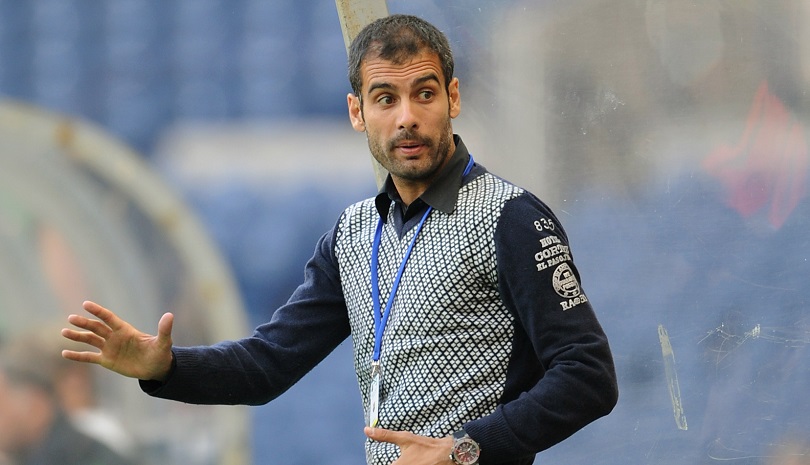
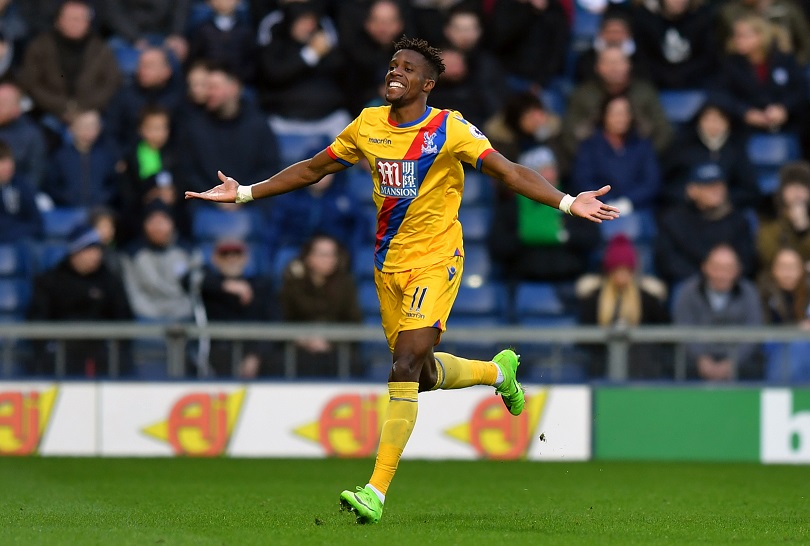
Wilfried Zaha (2013): "As a kid I used to really look up to Ronaldinho and loved watching him play. I would look at some of his skills and try them myself in training. If I mastered it, I would try them in a game. The flip-flap Ronaldinho used to do, I’ve tried that so many times in games and it has worked.”
Carles Puyol (2004): “The greatest compliment I could give him is that he’s given Barcelona our spirit back. He has made us smile again.”
“Not at all,” he insists. “I really wanted something different, that’s why I decided to leave. I still have many friends there, and they have always been very generous to me. Before I left Barcelona, Pep and I spoke. He wanted me to stay, but I wanted to try something different, and that’s all. Pep and I have a very good friendship. Not only Pep, but his brother is a friend as well – we have known each‑other since they were working at the academy. We’ve always been friends – if I had played under Guardiola, it wouldn't have been much different.
“But I chose to leave at that moment. Me and Frank Rijkaard arrived together, and we left together. Rijkaard left because he wanted to have a different life – he has a very low profile, a quiet lifestyle and he is happy like that. When I see Barcelona today, I still see a lot of that team that we created. The style is the same – ball possession, a special player out wide, it is not so different.”
That Ronaldinho was central to the Catalan club’s metamorphosis is something that still gives the Brazilian lots of pride.
“Sure,” he says. “Those years were a defining moment for my career and for the club. Since then the football has only got better, and we deserve some credit for that. I was very happy at Barcelona, just as I was also happy being a World Cup winner in 2002 – and I still think there is more happiness to come.”
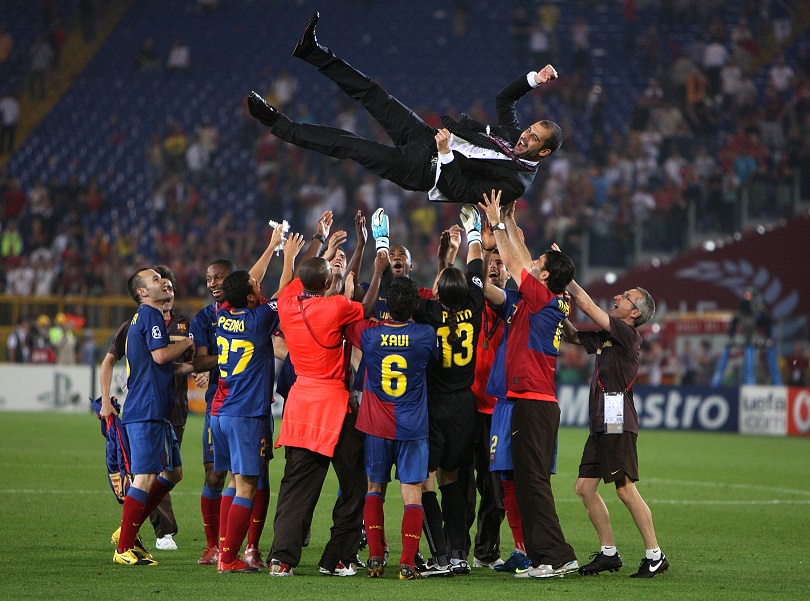
Back to Brazil
A dispute over unpaid wages saw him move on to Atletico Mineiro a year later, and while there he would be voted the best player in the Brazilian league
At the time of our interview, where that happiness comes from wasn't finalised, after so long without a club. “I don’t know where I’m going next,” he explains. “I like Asia very much, I always used to do a lot of advertisements there. India is very nice too, I was there for a futsal event. I never realised people like me and Brazil so much.”
“The USA is also a great destination,” adds Roberto, Ronaldinho’s brother and agent, an ex-footballer with clubs as varied as Gremio, Sion, Sporting Lisbon, Montpellier, Estrela da Amadora and Consadole Sapporo.
Ronaldinho spent three years with Milan, winning one Serie A title, before returning home to Brazil with Flamengo. Months after his arrival, Flamengo travelled to Santos for a league game. Inside half an hour they were 3-0 down, with Neymar bagging Santos’ third goal. Ronaldinho responded in kind by hitting a hat-trick, and Flamengo won 5-4.
A dispute over unpaid wages saw him move on to Atletico Mineiro a year later, and while there he would be voted the best player in the Brazilian league. In his second season with the club, in 2013, he helped them win the Copa Libertadores for the first time in their history and won the South American player of the year prize. Then came a move to Liga MX club Queretaro in Mexico.
“The club president was sensational, he made a very big effort to take me there,” Ronaldinho explains. “Our family loves Mexico because my brother had already played there [for UAG, in 2000]. Everyone in my family had already been there, and I already had a lot of fans since the Confederations Cup that Brazil had won there. I had a lot of offers but I was glad to be there. I always like to try out new things. And we took Queretaro to their first final – no one ever expected that.”
That 2015 Clausura play-off final would end in a defeat by Santos Laguna, but although Ronaldinho’s form wasn’t always stellar, he had made his mark in Mexico. Perhaps most notably, he came off the bench to score twice in a 4-0 win at Club America in the Azteca, and again the opposing fans gave him a standing ovation, just like Real Madrid’s fans had done at the Bernabeu 10 years earlier.
In the summer of 2015 Ronaldinho went back to Brazil again, this time to Fluminense. But he moved on only two months into an 18-month contract, telling the club that he didn’t feel capable of producing the sort of form that would do him justice. His early performances for the Rio side had drawn heavy criticism, and even some boos from the club’s own fans in one match.
Praise for the Premier League
The Blues unsuccessfully tried to lure Ronaldinho away from Barcelona during that era – later in his career, Manchester City, Blackburn Rovers, QPR and Stoke were also linked
Not that he’s been short of interest in the 17 months since then. Clubs the world over know about and love Ronaldinho. He’s been linked with moves to every continent on the globe. Among those interested in recent times have been Nacional in Uruguay, Las Vegas City in the USA, Wollongong Wolves in Australia, Kabuscorp in Angola, Antalyaspor in Turkey, his brother’s former club Sion in Switzerland, Persepolis in Iran, Tianjin Songjiang in China and Chennaiyin in India.
He did join the Indian Premier Futsal league last summer to play for Goa, but featured only twice before going back to Brazil after being appointed as a brand ambassador for the Paralympic Games in Rio.
His love of futsal is something he’s used to his advantage over the years – particularly against Chelsea at Stamford Bridge in 2005, when he netted an incredible toe-poke for Barcelona in the Champions League. “There was a lot of futsal in that goal,” he explains. “It was just a solution I found at that very moment, I didn’t plan it. Futsal is beautiful – not as much as it used to be, like in the days when keepers couldn’t also be strikers, but it's still beautiful.”
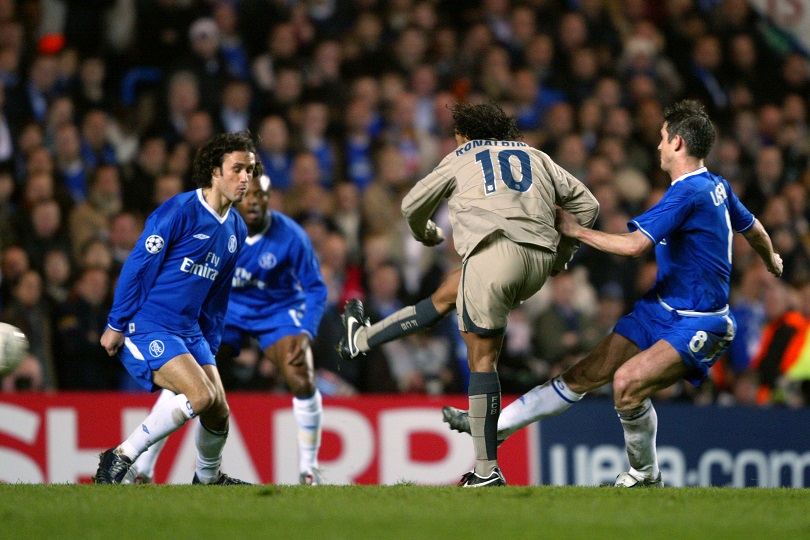
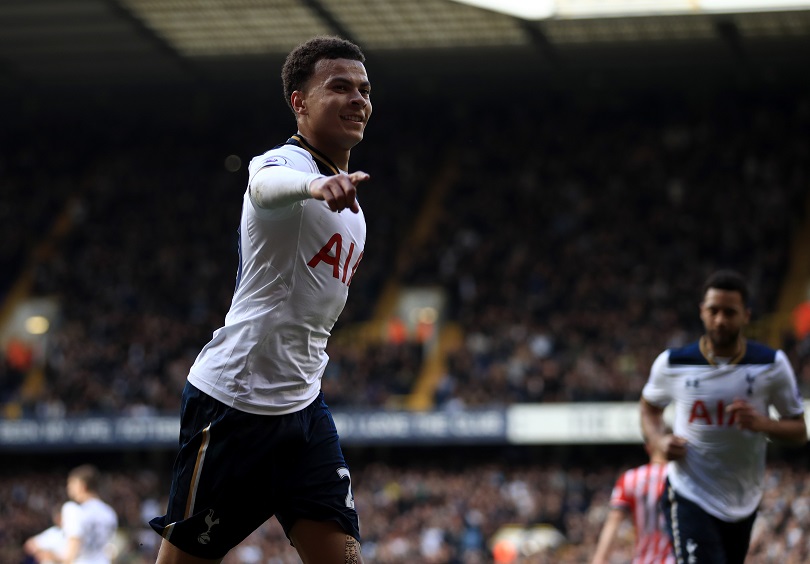
Dele Alli (2016): “A lot of kids that were my age loved Ronaldinho for his flair – you could see how much he loved the game. I can remember watching videos of him scoring overhead kicks and trying to recreate them myself, but never quite being able to pull them off.”
Frank Rijkaard (2004): “He is special. He is the best player in the world and he’s very important in the dressing room. He likes to laugh and take the pressure off all the other players, even though he’s under a great deal of pressure himself. His attitude is always contagious.”
Ronaldinho had several battles with Chelsea during his time at Barcelona – they lost that last-16 tie in 2005, when the clearly upset Brazilian and his Barça team-mates ended up scuffling with stewards in chaotic scenes at the final whistle. But they got their revenge on the way to becoming European champions a year later, then met the Blues in the group stage the campaign after that. Real Madrid aside, he names the Londoners as the most difficult opponent during his Blaugrana days.
“In Europe it had to be Chelsea,” he says. “We played against them every year in the Champions League – it was always fierce.”
The Blues unsuccessfully tried to lure Ronaldinho away from Barcelona during that era – later in his career, Manchester City, Blackburn Rovers, QPR and Stoke were also linked. Even Basingstoke Town made a cheeky bid – but sadly it wasn't successful.
“I don’t regret not having played in England, but it could have been special because it’s a fantastic league,” Ronnie admits, presumably in reference to the Premier League and not the Conference South. “Chelsea tried to take me there once, and some other teams were interested in signing me, too. The league there is so fast and so intense all of the time – it’s great to watch and not boring at all. I don’t tend to watch all 90 minutes of Premier League games, but I will see more of the highlights and the goals in the Premier League than I see of other leagues around the world.”
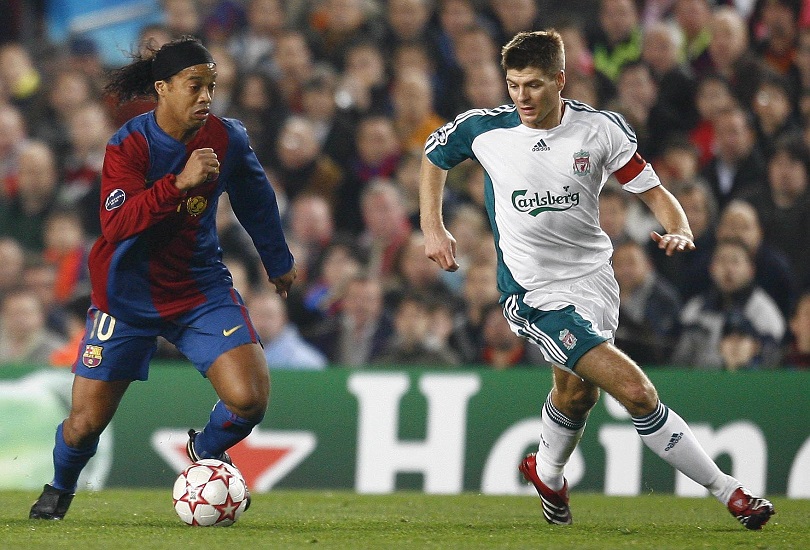
Inspiring a new generation
A Brazilian great in his own right these days, Neymar admits that he was star-struck when he met up with Ronaldinho during his younger days
Ronaldinho has done much to influence a new generation of players, in the Premier League and elsewhere. A raft of stars have explained in recent years that the Brazilian was their hero when they were growing up – among them Paul Pogba, Raheem Sterling, Thiago Alcantara, Dele Alli, Dimitri Payet, Gabriel Jesus, Daniel Sturridge, Sadio Mané, Willian and, of course, Neymar.
A Brazilian great in his own right these days, Neymar admits that he was star-struck when he met up with Ronaldinho during his younger days. “I’m kind of embarrassed when I talk to him, because he has always been an idol for me,” Neymar explained, when revealing that it had been Ronaldinho who had urged him to sign for Barcelona from Santos.
Bayern Munich’s Douglas Costa, too, tells FFT that he has wanted to emulate his hero since he was an eight-year-old watching Ronaldinho playing for Gremio.
“He is my biggest idol in the game,” the winger explains. “I grew up as a Gremio fan and he was the star there during that time. In Brazil, he’s loved not only because of his talent, but also because of his happiness while playing football and his capacity to bring joy to the people. The things he can naturally do with the ball… he’s brilliant, an example to me and the guy who inspired me the most when I was a kid.”
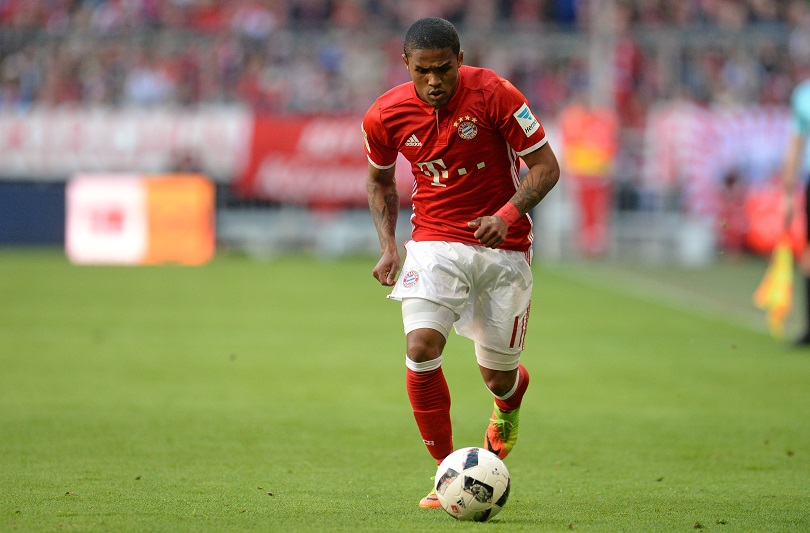
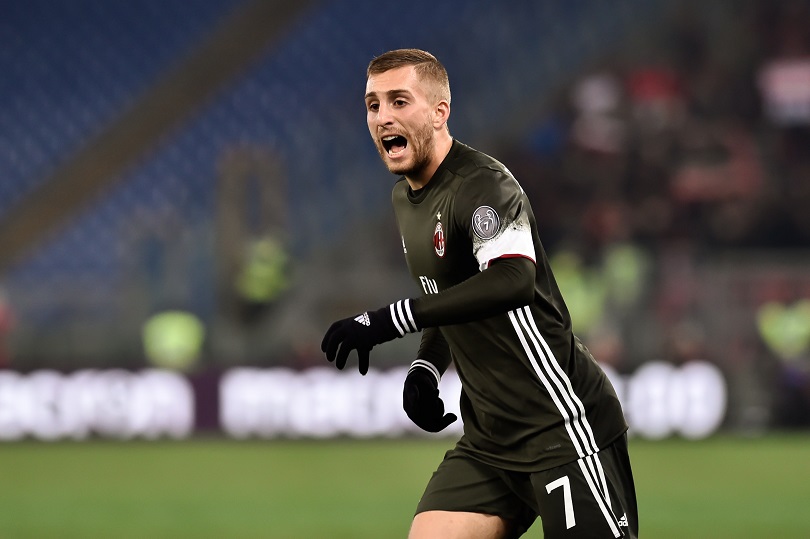
Gerard Deulofeu (2016): “Ronaldinho is a special man. When I was younger I would go to the Barcelona training ground to watch him. He’s my hero.”
Edgar Davids (2010): “For the skills and tricks, Ronaldinho was the best player that I ever played with.”
Does the man himself have a theory on why he has inspired so many youngsters? “I think it’s because I look like a kid too!” Ronaldinho laughs. “It’s very emotional for me to inspire world-class players – people like Pogba and Sterling, they are already among the best and it’s great to see them scoring the goals that make people love the sport even more.
I saw Dele Alli’s goal last year [at Crystal Palace] and it looked like a goal I would like to score – there is just no explanation for goals like that. It’s very thrilling to inspire someone to score such a great goal; I can barely put it all into words.
“I follow Gabriel Jesus and Gabriel Barbosa more closely because they’ve been in Brazil, and it’s great to inspire a new generation of Brazilian players who will take us all back to glories soon, I hope. The Olympic gold medal will give the new generation the boost they need to do well soon. It showed that there’s been a lot of improvement already, because these are all young players.
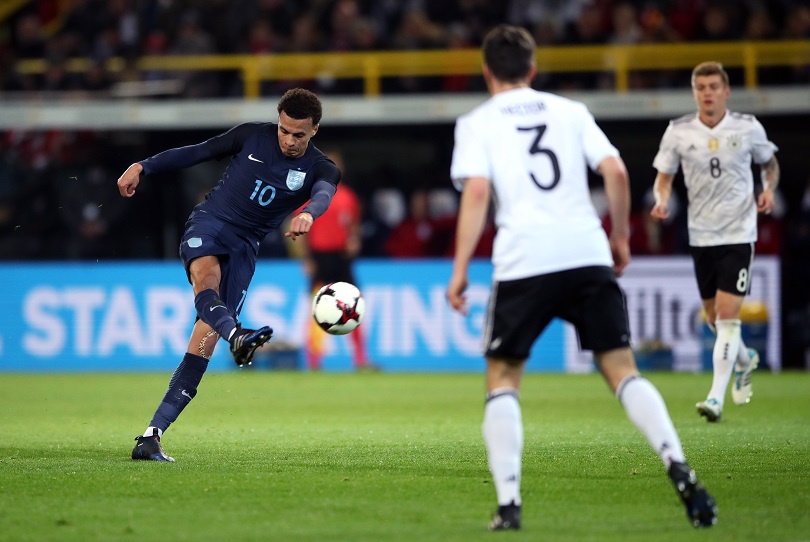
The senior team is also improving quickly – Brazil weren’t in good shape recently, the country and the national team weren’t doing well, but the team are picking themselves up now. I’m always optimistic – I focus on the positives and there are many more now.”
Ronaldinho picks out another of Brazil’s Olympic winners as his one to watch. “Luan is very good,” he says of the 23-year-old forward, who has been playing for Gremio. “He’s creative, different. He’s very skilful and he thinks differently. He’ll soon be in Europe. I want him at Barça, because his style would fit in very well in Spain and at Barcelona, too. For a Brazilian defender it’s difficult to play in Spain, but for a striker it’s almost a given, so Luan would fit in well there.”
Rooney gets some Ronnie love
He has skill, shoots well and protects the ball. He is steady –never on the ground. I have always liked his style
Among the world game’s more established players, Ronnie is still keeping faith with the man who holds scoring records for England as well as Manchester United.
“There are many great players these days – Luis Suarez and Neymar, for example,” he says. “Among the English, I still like Wayne Rooney. He has skill, shoots well and protects the ball. He is steady – never on the ground. I have always liked his style.
“It was great to play with Zlatan Ibrahimovic at Milan, too. I have got a great deal of admiration for him, a nice friendship. He’s so confident in himself. I like it.”
Who was the most skilful player he played alongside or against? “There’s too many on both sides – the Galacticos alone...” he says. “But there are two pictures I’ve seen that kind of answer that. In one there is me, Andrea Pirlo and Beckham ready to take a free-kick at Milan in a friendly match – imagine the nightmare for the keeper! Then the other is of that wall of Galacticos I talked about earlier, waiting for my free-kick.
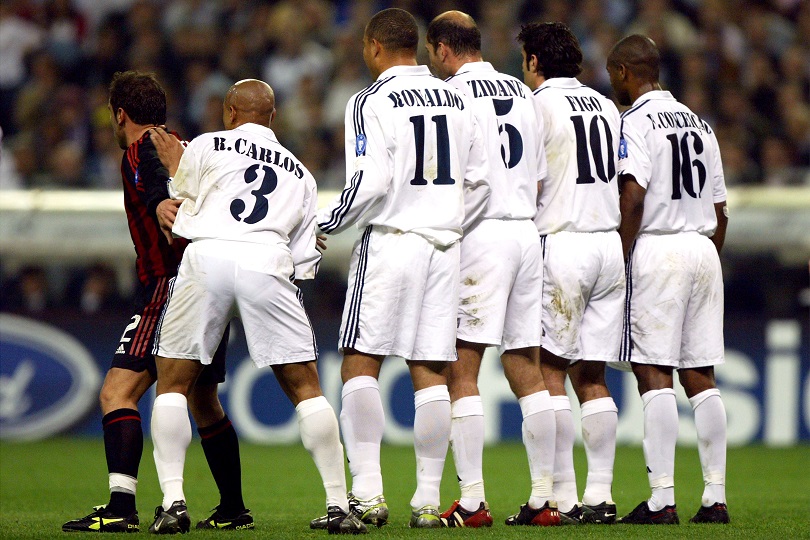
“I always loved seeing Zinedine Zidane play. I never had the pleasure to play with him, even in friendlies – I mean, not yet, there is still hope! But he made it look so simple. Things that everyone knows to be difficult were very easy for him.”
Asked who he prefers now, Lionel Messi or Cristiano Ronaldo, Ronaldinho diplomatically evades choosing between them.
“Well I have played with Messi and that was a huge pleasure, even during his early days,” Ronaldinho says. “We always enjoyed each other’s company when we managed to be together – even if it’s a little harder to talk to Messi these days because he basically has no vacations. I would have loved to have played with Ronaldo too, he is just fantastic. They are among the best ever, for sure.”
The best ever?
The Brazilian was just the sort of player for whom 90 minutes somehow did not seem enough – you could have happily watched him play football all day
That is beyond argument, but some argue that at his peak, albeit over a much shorter time period, Ronaldinho surpassed them both. “In my honest opinion, at that time I think Ronaldinho was bigger than both Messi and Cristiano Ronaldo,” Willian said a year ago.
Henrik Larsson played with both Messi and Ronaldo – the latter during a brief loan spell at Manchester United – but doesn’t hesitate when FFT asks him to choose the greatest player he ever played with.
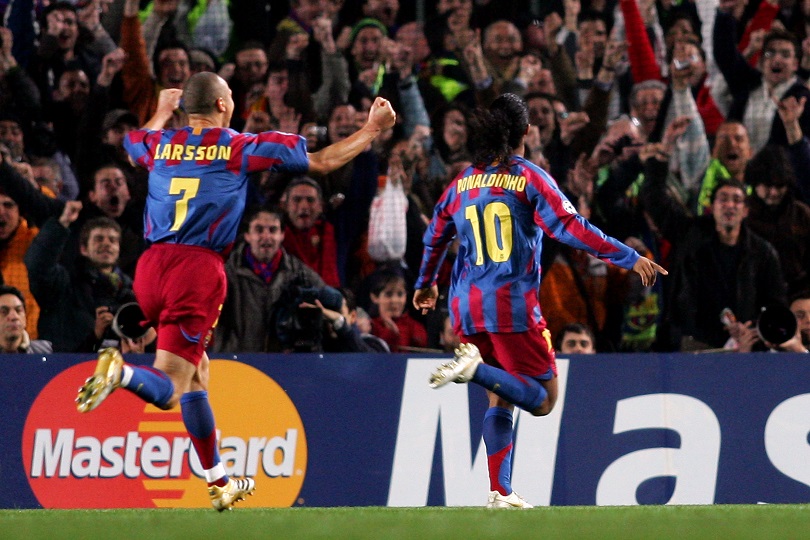
“Ronaldinho! The way that he was playing during the time I was at Barcelona, it was like he was from another planet,” the former Celtic and Barça striker says.
“He’s been a wonderful player,” another former Blaugrana team-mate, Ludovic Giuly, admits to FFT. “He’s a very good person, too – a quality that’s not so common for players at his level. I can tell you that he was also a virtuoso of the PlayStation – he was able to play football on the games console like he did on the pitch! On the field, he’s been unique. He created a style of his own.”
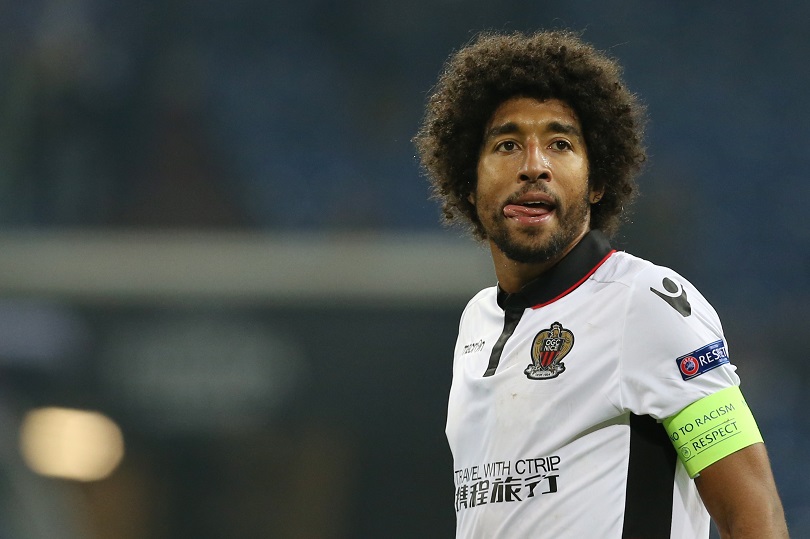
Dante (2017): “I will never forget how he welcomed me into the Brazil squad. He made me feel at home, and we got close during my initiation ceremony as I had to dance to a song that he also liked! It’s not difficult to understand why he is so admired as he is an exceptional dude. He is always carrying this different energy – he doesn’t treat anyone differently. He has a joy about doing what he does, and it is the kind of behaviour that benefits a dressing room.”
“He would just see your runs,” Larsson adds, detailing what really impressed him about the Brazilian. “I remember a game at Celta Vigo: he had the ball wide on the left, halfway into their half. I was on the right, I started a run and he spotted it, threading a pass in between everyone. Unfortunately I missed, but just to see the movement from that distance, with so many players around him, was something special.”
The Brazilian was just the sort of player for whom 90 minutes somehow did not seem enough – you could have happily watched him play football all day. Some did just that: Eden Hazard once told FFT that in his younger days, he spent hours watching clips of Ronnie on YouTube. Dele Alli told us that he’d also spend hours trying to mimic the Brazilian’s goals, having seen them online. And Wilfried Zaha explained he would study Ronaldinho’s skills, the flip-flap notably, and then spend day after day on the training ground trying to perfect the amazing trick.
“The flip-flap is by far the best,” Ronaldinho grins, when asked to choose his favourite skill. It was a skill that he would often use during his days at Barcelona – once deploying it to befuddle Alessandro Nesta and then blast home a stunning last-minute winner against Milan in the Champions League. “I always knew how to make it work,” he explains.
“It’s not just a beautiful dribble, it’s a skill that opens up gaps. Of course, you can use other dribbles to win some time, too, to cool down a match. And you could also use it to make a defender go easier on you. But the flip-flap is the very best – it’s the most artistic and the most productive. When I got it right, someone would take the fall!”
Ronnie knows a good samba
Music has never been far from his heart, as the various instruments around his apartment prove
Soon, Ronnie’s flip-flap days will be over, his playing days too. What then?
A career in politics maybe, like Romario and Bebeto? “No politics for me at all...” he smiles, ruling out following in the footsteps of some of his fellow former Brazilian stars. Probably a wise decision, as there are not that many congress sessions at 1.24am.
Will he stay in football? Some years ago he said he’d consider becoming a coach at the end of his playing days, but now he doesn’t sound so sure. “I’ve not even thought about it much,” says the 36-year-old, who recently became a club ambassador for Barcelona. “I might be an aide to my brother [and his agency] at some point, and watch DVDs! But I don’t like the meetings.
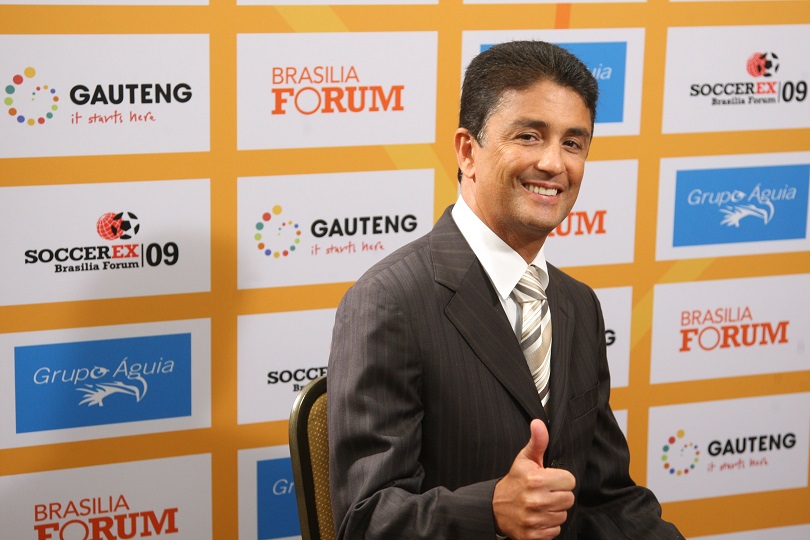
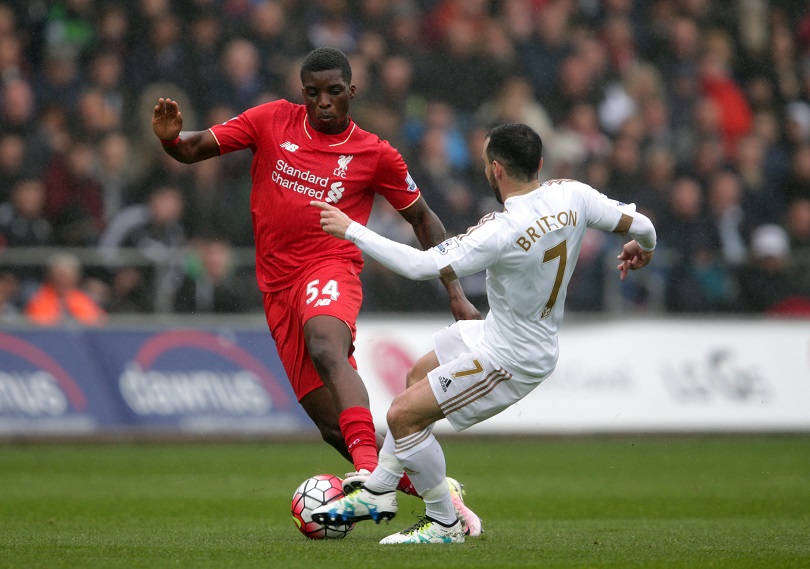
Sheyi Ojo (2016): “As a young player growing up, my main idol was Ronaldinho, as he always plays the game with a smile on his face."
Ruud Gullit (2007): “He is a flexible player who can do things that are just simply unbelievable.”
“I also want to do some more for footvolley, to make it an Olympic sport. It’s growing and it’s a show. There’s a world league set up now and I want to practise to be at the level of the players that are also there.”
A mixture of football and beach volleyball, it sounds like it was made for a retired Ronnie. Next stop, the Copacabana. And once football is out of the way, will he have more time to dedicate to partying? Well, sort of. He intends to have a good time, that’s for sure, albeit via a slightly different medium. “I want to work with music,” he says. “Each day I love it more and more.”
Music has never been far from his heart, as the various instruments around his apartment prove. There was the time, for instance, when the Brazil squad were on the plane back home from Japan after lifting the 2002 World Cup and Ronaldinho whipped out a drum from the overhead locker and started entertaining the squad with a spot of pagode, a musical style that is derived from samba.
It’s the sort of thing he liked to do pretty often. “He would just be hitting the drums with everything he had in his hand to try to create a rhythm,” says ex-Barça team-mate Giuly. “Music is in his soul.”
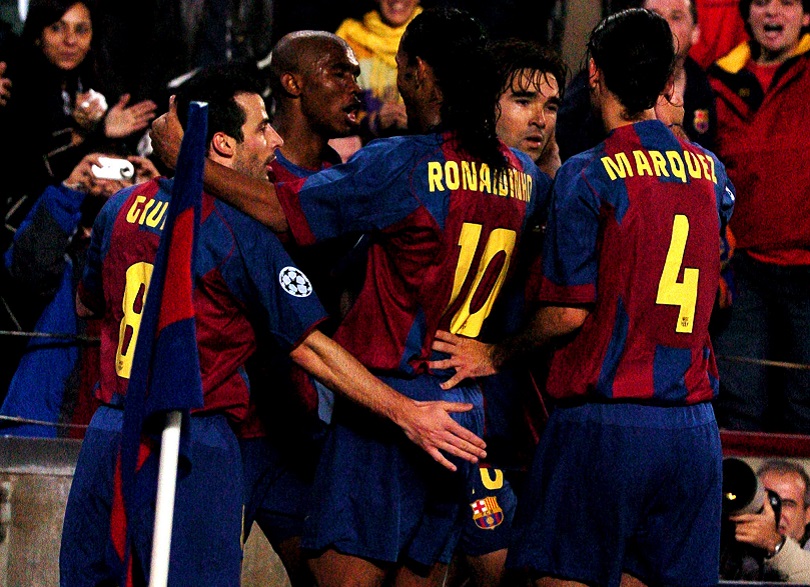
“When I got on the bus to go to a match and Ronaldinho was there playing the drums, I knew what the game would be like,” adds defender Juan, one of Ronnie’s former Brazil team-mates. “If he was smiling and singing, then I knew we were set to win. He is from the south, a region that isn’t that great with samba. But he is different – he has the voice, the ways of Rio de Janeiro.”
That voice was put on show in 2014 when he sung on the track Vai Na Fe, a ditty that he composed himself in collaboration with rapper and friend Edcity.
“He has a got a good voice, he knows how to play and he can tell a good samba from a bad one,” says famous samba artist Jorge Aragao. “Ronaldinho calls me his godfather but the truth is samba was already in him. I’m sure he’ll do great if he wants to work with music in some form.”
Putting the time in
A lot of musicians come to my house to perform because they know how much I love what they do
And Ronaldinho is very serious about it.
“I want to study, to learn sound engineering and producing,” he says. “I’m very curious about it. I want to have a studio built at my home. I like all genres, a bit of everything. I’m composing – one of my recent songs was used as a theme for the Paralympics in Rio, which made me even more excited to watch all of the Paralympics.
“A lot of musicians come to my house to perform because they know how much I love what they do. There are so many good people that play here and have no opportunity to do more. I want the world to see their talents.”
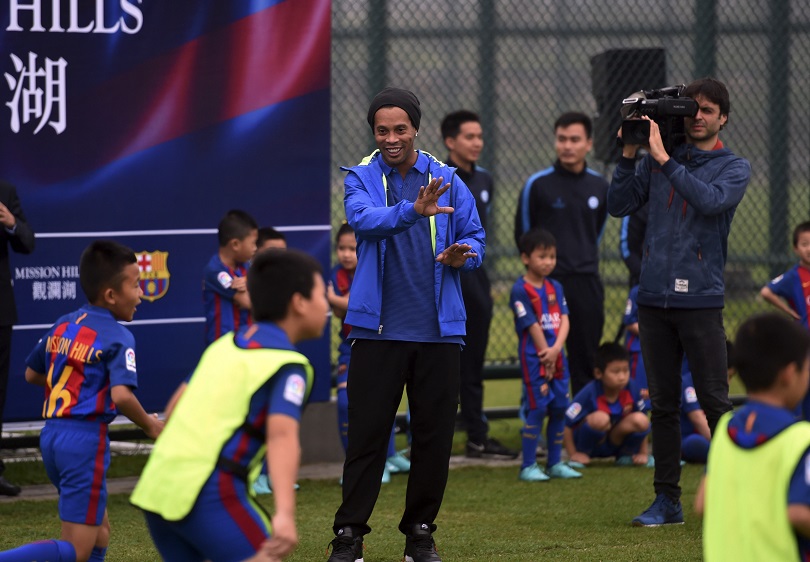
For almost 20 years, the world has seen and loved Ronaldinho’s talents out on the football field. The chance to relive it all with the man himself has been a privilege.
“Thanks for coming,” he cheerily says to FourFourTwo as our interview comes to an end. “Now excuse me,” he adds, “as in two hours I’ll be going to China for a sponsorship deal!” With a parting grin, he bids farewell.
Soon he will bid farewell to the game that has made him a hero to millions upon millions of football fans – in China, in Brazil, in Europe, in fact pretty much everywhere. His career may be almost at an end, but in those who worshipped him, in those who felt compelled to follow in his footsteps, in those he inspired to greatness, his impact will continue to last for many more years to come.
This feature originally appeared in the March 2017 issue of FourFourTwo. Subscribe!

Chris joined FourFourTwo in 2015 and has reported from 20 countries, in places as varied as Jerusalem and the Arctic Circle. He's interviewed Pele, Zlatan and Santa Claus (it's a long story), as well as covering the World Cup, Euro 2020 and the Clasico. He previously spent 10 years as a newspaper journalist, and completed the 92 in 2017.
